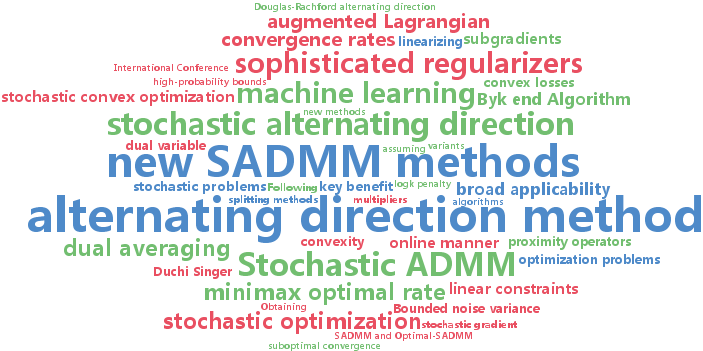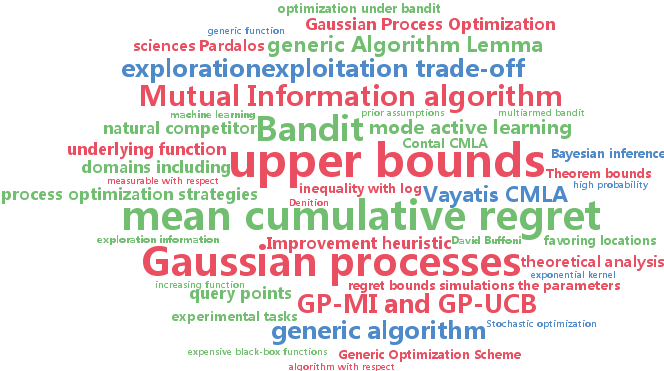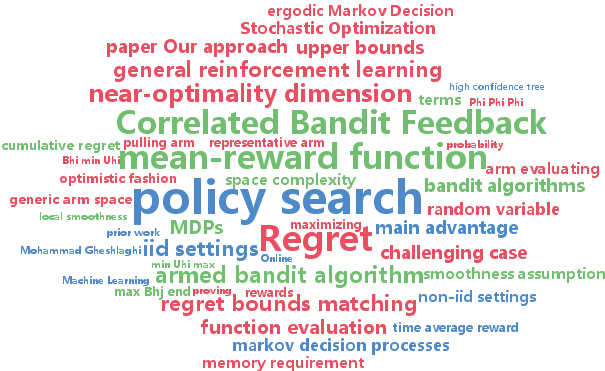stochastic optimization
-
Samaneh Azadi and Suvrit Sra
Towards an optimal stochastic alternating direction method of multipliers (pdf)
We study regularized stochastic convex optimization subject to linear equality constraints. This class of problems was recently also studied by Ouyang et al. (2013) and Suzuki (2013); both introduced similar stochastic alternating direction method of multipliers (SADMM) algorithms. However, the analysis of both papers led to suboptimal convergence rates. This paper presents two new SADMM methods: (i) the first attains the minimax optimal rate of O(1/k) for nonsmooth strongly-convex stochastic problems; while (ii) the second progresses towards an optimal rate by exhibiting an O(1/k^2) rate for the smooth part. We present several experiments with our new methods; the results indicate improved performance over competing ADMM methods.
-
Emile Contal and Vianney Perchet and Nicolas Vayatis
Gaussian Process Optimization with Mutual Information (pdf)
In this paper, we analyze a generic algorithm scheme for sequential global optimization using Gaussian processes. The upper bounds we derive on the cumulative regret for this generic algorithm improve by an exponential factor the previously known bounds for algorithms like GP-UCB. We also introduce the novel Gaussian Process Mutual Information algorithm (GP-MI), which significantly improves further these upper bounds for the cumulative regret. We confirm the efficiency of this algorithm on synthetic and real tasks against the natural competitor, GP-UCB, and also the Expected Improvement heuristic.
-
Taiji Suzuki
Stochastic Dual Coordinate Ascent with Alternating Direction Method of Multipliers (pdf)
We propose a new stochastic dual coordinate ascent technique that can be applied to a wide range of regularized learning problems. Our method is based on alternating direction method of multipliers (ADMM) to deal with complex regularization functions such as structured regularizations. Although the original ADMM is a batch method, the proposed method offers a stochastic update rule where each iteration requires only one or few sample observations. Moreover, our method can naturally afford mini-batch update and it gives speed up of convergence. We show that, under mild assumptions, our method converges exponentially. The numerical experiments show that our method actually performs efficiently.
-
Mohammad Gheshlaghi azar and Alessandro Lazaric and Emma Brunskill
Online Stochastic Optimization under Correlated Bandit Feedback (pdf)
In this paper we consider the problem of online stochastic optimization of a locally smooth function under bandit feedback. We introduce the high-confidence tree (HCT) algorithm, a novel anytime $\mathcal X$-armed bandit algorithm, and derive regret bounds matching the performance of state-of-the-art algorithms in terms of the dependency on number of steps and the near-optimality dimension. The main advantage of HCT is that it handles the challenging case of correlated bandit feedback (reward), whereas existing methods require rewards to be conditionally independent. HCT also improves on the state-of-the-art in terms of the memory requirement, as well as requiring a weaker smoothness assumption on the mean-reward function in comparison with the existing anytime algorithms. Finally, we discuss how HCT can be applied to the problem of policy search in reinforcement learning and we report preliminary empirical results.
-
Shai Shalev-Shwartz and Tong Zhang
Accelerated Proximal Stochastic Dual Coordinate Ascent for Regularized Loss Minimization (pdf)
We introduce a proximal version of the stochastic dual coordinate ascent method and show how to accelerate the method using an inner-outer iteration procedure. We analyze the runtime of the framework and obtain rates that improve state-of-the-art results for various key machine learning optimization problems including SVM, logistic regression, ridge regression, Lasso, and multiclass SVM. Experiments validate our theoretical findings.




